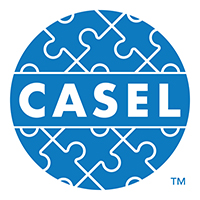2019 SEL EXCHANGE CONFERENCE
The inaugural, sold out 2019 SEL Exchange attracted 1,500+ leaders and experts committed to SEL from more than 30 countries worldwide. Check out 2019 key insights, speakers, sessions, exhibitors, and more below.
The 2019 SEL Exchange featured:
- Founding leaders who catalyzed the SEL movement
- Three, day-long pre-conference institutes
- Plenary sessions on key topics such as building a culture of equity through SEL and the future of work
- More than 400 presenters from organizations around the country and the world who led 100+ breakout sessions on SEL and assessment, parent and community engagement, systemic implementation, and more
- 130 poster presentations in which researchers and practitioners showcased their work in a “science fair”-style setting
- 50 exhibitors shared their quality SEL programs, tools, products, and services
- Participation from local and national youth and youth groups to ensure their voices are part of the solution as we work together on specific challenges
In addition, throughout the three days, the 2019 SEL Exchange featured product and service demonstrations, an SEL library with key resources, interactive SEL activities, and many other experiences.
2019 PLENARIES
SEL: The Global Movement
Nancy Guerra, Ed.D.; Anantha Duraiappah, Ph.D.; Koji Miyamoto; Louka Parry, M.A.

View a recording of the panel (43 mins)
Regardless of our differences, educators across the world share a single goal: to see children thrive. This shared goal has fueled global commitment to SEL and brought participants from all over the world to the 2019 SEL Exchange to share their experiences, expertise, insights, and questions. In this plenary, panelists described the ways educators in countries such as Japan, Uganda, and New Zealand have worked to bring SEL to their students.
Plenary: Building a Culture of Equity Through SEL
Robert J. Jagers, Ph.D.; Taryn Ishida, M.A.; Roberto, Rivera, M.Ed.; Dena Simmons, Ed.D.; Meena Srinivasan, M.A.
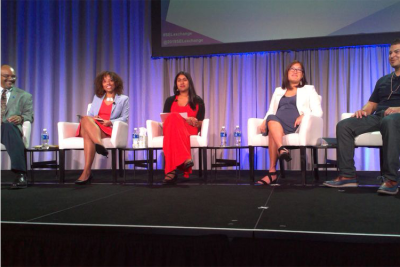
View a recording of the panel (75 mins)
SEL can address issues such as privilege, power, race, social justice, and community, and help build a new system of schooling that serves all children. Key takeaways:
- SEL can help adults and students have courageous conversations about race, privilege, and the power dynamics that have dispossessed minorities for centuries.
- Transformational SEL offers a means for addressing social justice and the underlying cultural and political structures that have long promoted inequities (race, class, gender, etc.).
- Seeing and nurturing these connections can lead to a collective paradigm shift in how leaders lead and schools teach.
Plenary: Civil Society, Citizenship, and SEL
Janice Jackson, Ed.D.; Linda Darling-Hammond, Ed.D.; Rick Hess, Ph.D.; Tim Ryan, J.D.
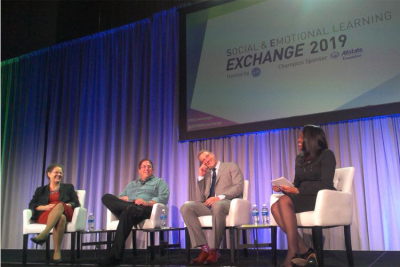
View a recording of the panel (60 mins)
How can we channel the enthusiasm for SEL into a sustainable movement that supports a civil society? Key takeaways included:
- To prepare students to participate in democracy, educators must empower them to take charge of their own learning.
- SEL is bipartisan. It’s not a red-state or blue-state issue, but a commonsense approach to education and youth development.
- Reflecting on past education initiatives that failed to produce hoped-for gains, panelists noted that success of the SEL movement will depend upon buy-in from those “on the ground” doing the work: teachers, school staff, parents, and community partners.
Plenary: The Future of Work
Jaime Uzeta, M.B.A.; Meria Carstarphen, Ed.D.; Merrilea Mayo, Ph.D.; Audrey Williams-Lee, M.S.
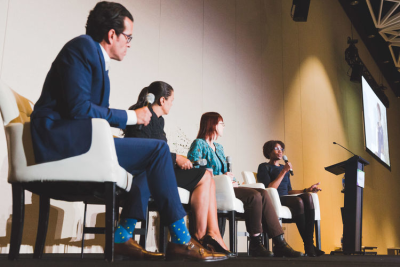
View a recording of the panel (53 mins)
What will it take for schools to address the needs of employers? The conversation reminded attendees to work with students. To ensure the most positive outcomes for all students, their voices must be included in the conversation. As we look beyond the school, core SEL skills such as self-management will likely remain a dominant and necessary skill in the workplace. One panelist highlighted “the five essential future competencies” in use in her company, which have the SEL competencies at their core: creativity and growth mindset, adaptability, truth seeking, first principles seeking, and emotional intelligence.
Reimagining Boys in the 21st Century
Niobe Way, Ed.D.; Ashanti Branch, M.Ed.; Matt Englar-Carlson, Ph.D.; Lily Howard Scott
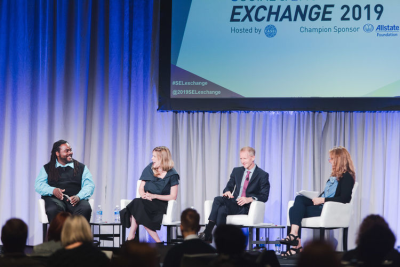
View a recording of the panel (60 mins)
Boys have feelings, too, and benefit from efforts to help them express their emotions constructively. Panelists emphasized that boys and young men need the permission, space, and support to unveil their vulnerabilities. They also highlighted that storytelling is a powerful tool for catharsis and growth. Adults need to listen and create environments where it is safe to reveal what is behind their everyday masks.
